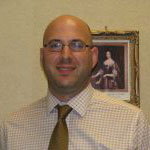
I am an assistant professor in the history department. I teach classes on history of science, intellectual history, historical methods, early modern British history, and European history.
Within the COLL curriculum, I am particularly excited about teaching history of science classes at the COLL 200 level. I am currently piloting a course entitled Historical Perspectives on Science, which provides students with a broad overview of the global history of natural inquiry while also familiarizing them with methods of historians, sociologists, anthropologists, and philosophers of science.
In the future, I look forward to creating a COLL 100 course on Media Revolutions from antiquity to the present. This class will both examine the dynamics by which new media are created and the social, political, and intellectual effects of such transformations.
I am happy to share my syllabi for both of these classes.
My research interests bridge early modern history of science, history of the book, and travel and geographical learning. They come together my book, entitled Walter Ralegh’s History of the World and the Historical Culture of the Late Renaissance, which was published by the University of Chicago Press in fall 2012 and is now out in paperback (http://press.uchicago.edu/ucp/books/book/chicago/W/bo13706688.html). The book examines how practices of studying the past transformed the political and intellectual cultures of early modern Europe.
I am currently beginning two new book projects: one on the ways in which the growing emphasis placed on archival practices transformed British politics in the 17th and 18th centuries, and one examining how the major intellectual transformations of early modern Europe — whether in the sphere of politics, religion, scholarship, or warfare — all hinged on the elevation of a small set of practices for making such knowledge, such as empiricism, quantification, and visualization.
I have recently completed articles and book chapters addressing the analysis of ancient Roman warfare in early modern England; the significance of continental historical works to Elizabethan political culture; the late 17th century dismantling of the view that natural history should be an exercise in collecting; and the practice of reading by which the Elizabethan scholar Gabriel Harvey came to value technological knowledge.
My published articles include “An Ocean of Lies: The Problem of Historical Evidence in the Sixteenth Century,” Huntington Library Quarterly 74.3 (2011): 375-400; “From Abbey to Archive: Managing Texts and Records in Early Modern England,” Archival Science 10.3 (2010): 249-266, “‘Abraham, Planter of Mathematics’: Histories of Mathematics and Astrology in Early Modern Europe,” Journal of the History of Ideas 67.1 (2006): 87-106; and “The English Polydaedali: How Gabriel Harvey Read Late Tudor London,” Journal of the History of Ideas 66.3 (2005): 351-381.
Speak Your Mind